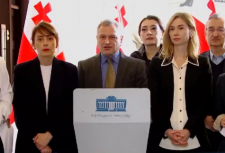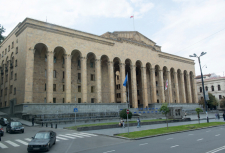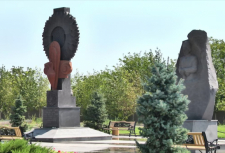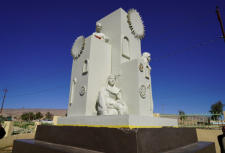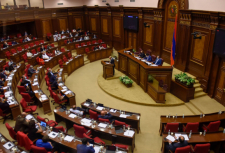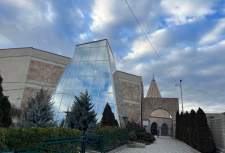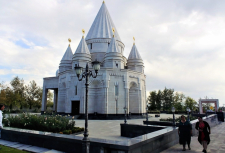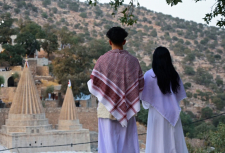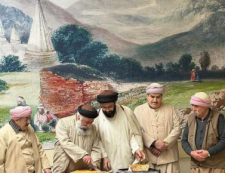Yezidism – its background observances and textual tradition. A Later document
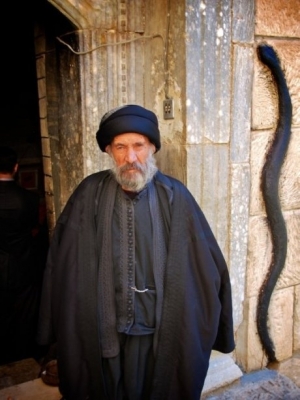
Philip G. Kreyenbroek
In 1908 a scion of the dynasty of the secular rulers of the Yezidis, Isma'il Beg son of 'Ebdi Beg, drew up a somewhat similar document at the request of the Armenian Yezidis. This document seems to reflect the preoccupations of its author who, according to Guest, "wanted to revitalise the Yezidi community", and "travelled around the Yezidi communities as a self-appointed apostle, preaching, blessing and collecting alms". The following is a translation of the text:
(1) We believe in one God, the Creator of Heaven, Earth and of all that is alive.
(2) Our Prophet is Ezid.
(3) The Yezidis have no scripture; God's Word is handed down from father to son according to the tradition of Gyli-e AzimP
(4) It is forbidden for Yezidis to enter into relations with those who belong to other nations. Otherwise they incur the curse of God.
(5) The Yezidis must treat other nations with respect, for all exist in accordance with God's Will.
(6) The Yezidis must serve God according to the rules laid down by our Prophet Ezid. Otherwise they incur the curse of God.
(7) A Yezidi may not abduct the legal wife of another. No Yezidi may help the abductor or the abducted, or provide shelter. The one who is abducted must be returned to her husband, and the abductor shall be tried according to Yezidi law. If the abducted woman refuses to return to her husband's house, she shall be excommunicated.
(8) No Yezidi may many the wife of the brother of his father or mother; otherwise the procedure shall be as specified under Article 7,
(9) The Yezidi clergy is divided into three clans: the Sheykhs of Sheykh Hesen 64 of Sheykh Shems and of Sheyhk Obekir. Every Sheykh must choose a wife from his own clan.
(10) The Pirs are divided into two clans: Pire Hosmamama and Pire Krafata and the others (like) Pire Omarkhale and others. Every Pir must choose a wife from his own clan.
(11) The Yezidi laymen are called mirid. They are not entitled to marry the daughters of the priestly classes, only their own. In case of offence, severe measures shall be taken.
(12) God created the world and all creatures in six days, the seventh day he rested. A Yezidi shall therefore work six days and rest the seventh, namely the Saturday.66 Offenders shall pay a penalty of five roubles. It is the task of the Qadi who is appointed by myself in every district for the performance of acts of religion, to watch over the observance of this rule. My appointment of a Qadi is confirmed by the Government, i.e., by the Governors. Each Qadi has a seal (engraved) with his name and the name of his district
(13) No Yezidi may divorce his wife unless he can prove infidelity, viz. in the presence of at least three witnesses. In the case of an offence the culprit shall be severely punished.
(14) If a Yezidi betrothes his son and he cannot pay the bride price, he may not leave the bride in her father's house for more than three years,
(15) It is strictly forbidden for a Yezidi to lend money against interest.
(16) Usury is strictly forbidden.
(17) It is forbidden to have a bath, change underclothes or have sexual intercourse on a Wednesday.
(18) The Yezidi priestly men must wear a beard. If they do not, then the laymen need not recognize them as priest men and need not give them offerings.
(19) Theft is strictly forbidden, for it is said, "The left hand shall not use the work of the right hand." Thieves must be handed over to the authorities. Receivers (of stolen goods) shall be severely punished.
(20) Yezidis must deal honestly with ail nations and all men, and not injure them or use another's property without his knowledge. A guilty man incurs the curse of God.
(21) In every Yezidi village there must be a Chawush who, at the death of a Yezidi, shall fast for seven days and recite the Qewl at the dead person's grave.
(22) In every Yezidi village three men shall be appointed to watch over the observance of these rales. Negligence on the part of the guardians incurs the curse of God.
(23) Affairs of division (of property) and separation shall be submitted to the district Qadl.
(24) Every Yezidi musl hold a commemorative feast for his dead relatives once a year.
(25) The Yezidis must build schools and instruct their children in science and languages.
(26) The supervision of the schools as regards moral and spiritual matters is the task of the Qadi of the district, who should also occupy himself with (questions of their) materia] support.
The first of these two documents elevates to the status of religious obligations some practices which most Yezidis would consider to be no more than pious ideals. The second, with its preoccupation with such notions as a Yezidi system of jurisdiction and schooling for Yezidi children, goes much further. It appears to represent one prominent individual's perception of Yezidism as it ought to be practised in the twentieth century.!
Tags: #yazidisinfo #yazidi #yezidi
Yezidism – its background observances and textual tradition. A Later document

Philip G. Kreyenbroek
In 1908 a scion of the dynasty of the secular rulers of the Yezidis, Isma'il Beg son of 'Ebdi Beg, drew up a somewhat similar document at the request of the Armenian Yezidis. This document seems to reflect the preoccupations of its author who, according to Guest, "wanted to revitalise the Yezidi community", and "travelled around the Yezidi communities as a self-appointed apostle, preaching, blessing and collecting alms". The following is a translation of the text:
(1) We believe in one God, the Creator of Heaven, Earth and of all that is alive.
(2) Our Prophet is Ezid.
(3) The Yezidis have no scripture; God's Word is handed down from father to son according to the tradition of Gyli-e AzimP
(4) It is forbidden for Yezidis to enter into relations with those who belong to other nations. Otherwise they incur the curse of God.
(5) The Yezidis must treat other nations with respect, for all exist in accordance with God's Will.
(6) The Yezidis must serve God according to the rules laid down by our Prophet Ezid. Otherwise they incur the curse of God.
(7) A Yezidi may not abduct the legal wife of another. No Yezidi may help the abductor or the abducted, or provide shelter. The one who is abducted must be returned to her husband, and the abductor shall be tried according to Yezidi law. If the abducted woman refuses to return to her husband's house, she shall be excommunicated.
(8) No Yezidi may many the wife of the brother of his father or mother; otherwise the procedure shall be as specified under Article 7,
(9) The Yezidi clergy is divided into three clans: the Sheykhs of Sheykh Hesen 64 of Sheykh Shems and of Sheyhk Obekir. Every Sheykh must choose a wife from his own clan.
(10) The Pirs are divided into two clans: Pire Hosmamama and Pire Krafata and the others (like) Pire Omarkhale and others. Every Pir must choose a wife from his own clan.
(11) The Yezidi laymen are called mirid. They are not entitled to marry the daughters of the priestly classes, only their own. In case of offence, severe measures shall be taken.
(12) God created the world and all creatures in six days, the seventh day he rested. A Yezidi shall therefore work six days and rest the seventh, namely the Saturday.66 Offenders shall pay a penalty of five roubles. It is the task of the Qadi who is appointed by myself in every district for the performance of acts of religion, to watch over the observance of this rule. My appointment of a Qadi is confirmed by the Government, i.e., by the Governors. Each Qadi has a seal (engraved) with his name and the name of his district
(13) No Yezidi may divorce his wife unless he can prove infidelity, viz. in the presence of at least three witnesses. In the case of an offence the culprit shall be severely punished.
(14) If a Yezidi betrothes his son and he cannot pay the bride price, he may not leave the bride in her father's house for more than three years,
(15) It is strictly forbidden for a Yezidi to lend money against interest.
(16) Usury is strictly forbidden.
(17) It is forbidden to have a bath, change underclothes or have sexual intercourse on a Wednesday.
(18) The Yezidi priestly men must wear a beard. If they do not, then the laymen need not recognize them as priest men and need not give them offerings.
(19) Theft is strictly forbidden, for it is said, "The left hand shall not use the work of the right hand." Thieves must be handed over to the authorities. Receivers (of stolen goods) shall be severely punished.
(20) Yezidis must deal honestly with ail nations and all men, and not injure them or use another's property without his knowledge. A guilty man incurs the curse of God.
(21) In every Yezidi village there must be a Chawush who, at the death of a Yezidi, shall fast for seven days and recite the Qewl at the dead person's grave.
(22) In every Yezidi village three men shall be appointed to watch over the observance of these rales. Negligence on the part of the guardians incurs the curse of God.
(23) Affairs of division (of property) and separation shall be submitted to the district Qadl.
(24) Every Yezidi musl hold a commemorative feast for his dead relatives once a year.
(25) The Yezidis must build schools and instruct their children in science and languages.
(26) The supervision of the schools as regards moral and spiritual matters is the task of the Qadi of the district, who should also occupy himself with (questions of their) materia] support.
The first of these two documents elevates to the status of religious obligations some practices which most Yezidis would consider to be no more than pious ideals. The second, with its preoccupation with such notions as a Yezidi system of jurisdiction and schooling for Yezidi children, goes much further. It appears to represent one prominent individual's perception of Yezidism as it ought to be practised in the twentieth century.!
Tags: #yazidisinfo #yazidi #yezidi
